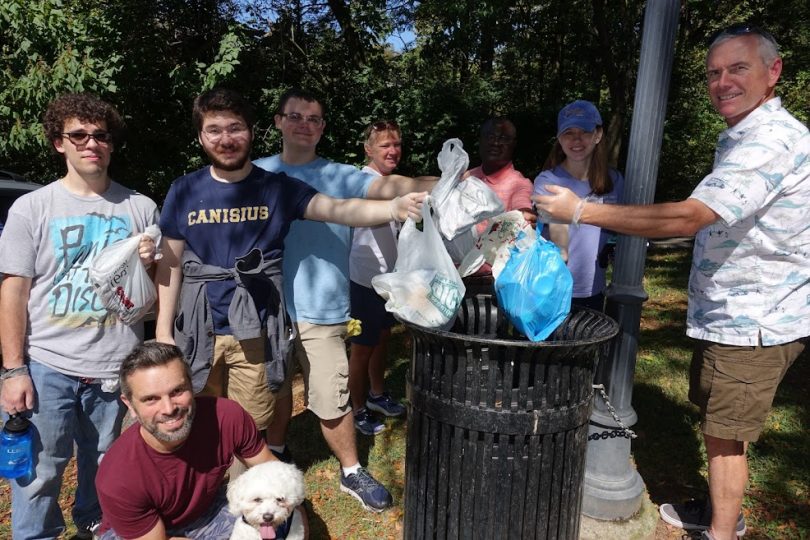Edgeboro Moravian Church Members Cleaning Up Their Neighborhood
“What Do You Believe?”
by Bishop Chris Giesler
Preaching Text: Matthew 16:13-20
Soon after John baptizes Jesus in the Jordan River in Matthew chapter 4, Jesus is led out into the wilderness by the Holy Spirit for his forty-day retreat or time of discernment. There, Jesus is confronted with temptations to use his God-given gifts for self-gratification, self-aggrandizement, and self-promotion. Instead, Jesus settles on focusing his efforts on the in-breaking of the kingdom of God into the world. In Luke’s Gospel, we are told that Jesus goes from that experience back to his home in Nazareth, and while in the synagogue for the Sabbath service, Jesus reads from the Prophet Isaiah to describe how he planned to do this. “The Spirit of the Lord is upon me, because he has anointed me to bring good news to the poor. He has sent me to proclaim release to the captives and recovery of sight to the blind, to let the oppressed go free, to proclaim the year of the Lord’s favor.” (Luke 4:18-19) This is who Jesus believes himself to be!
In Matthew’s 11th chapter, the imprisoned John the Baptist sends some of his disciples to ask Jesus about his identity. They ask Jesus, “Are you the one who is to come, or are we to wait for another?” Jesus answered them, “Go and tell John what you hear and see: the blind receive their sight, the lame walk, the lepers are cleansed, the deaf hear, the dead are raised, and the poor have the good news brought to them.” This is who Jesus believes himself to be!
Fast forward to Matthew chapter 16 and our lesson for this week. Jesus and his disciples have taken another excursion out of the country to the city of Caesarea-Philippi. This was a city just to the north of Galilee and named to honor Caesar, the Roman emperor, and Philip, son of Herod the Great, who now ruled that section of Roman-occupied territory. In this place, named after people who symbolized military power and oppression, Jesus asked his disciples several essential questions.
Jesus first asked them who people thought he was. These disciples had already heard a good many sermons, witnessed healings, and had no doubt heard a lot of people talking about just who they felt Jesus to be. They answered that some thought Jesus was John the Baptist, Elijah, or Jeremiah. These are telling responses. Many people in that day and age felt that John the Baptist was the forerunner of the Messiah but had not yet determined just who he was forerunning for. Faithful Jews would have known that Elijah and Jeremiah were prophets who were forerunners to the coming Messiah. In naming Jesus with them, they felt he was yet another prophet preparing for the expected Messiah. This is who people thought Jesus to be. Their answers were close but not close enough.
So Jesus then turns and asks his disciples more directly who they felt him to be. I can almost picture the disciples taking a quiet step back, leaving Simon Peter as the only one left exposed. And Peter, never one to be shy or reserved, immediately speaks up and declares Jesus to be “the Messiah, the son of the Living God.” This is who Peter believes Jesus to be!
It is essential for each of us as individual Christians, and then we as part of the body of Christ in the world today, to answer this very question as well. Who do you say that Jesus is? Who do we say that Jesus is?
In the Moravian Church, our “Ground of the Unity” tells us:
With the whole of Christendom we share faith in God the Father, the Son, and the Holy Spirit. We believe and confess that God has revealed Himself once and for all in His Son Jesus Christ; that our Lord has redeemed us with the whole of humanity by His death and His resurrection; and that there is no salvation apart from Him. We believe that He is present with us in the Word and the Sacrament; that He directs and unites us through His Spirit and thus forms us into a Church. We hear Him summoning us to follow Him, and pray Him to use us in His service. He joins us together mutually, so that knowing ourselves to be members of His body we become willing to serve each other.
This is an excellent place for us to start, but ultimately, each of us needs to come to our own beliefs. There are no secondhand believers. God has no grandchildren, only children. In other words, we must make our own profession of faith and live it. This is important because who we believe Jesus to be will ultimately define what we believe Jesus calls us to do in the world today. In many ways, our perception of Jesus’ identity will determine our mission in life.
Let’s begin this process by looking at whom Jesus felt himself to be and then hearing his call to go and do likewise.







